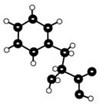RSP Amino Acid Analogues at Drug Discovery Technology


RSP sells its amino acid derivatives in kits. Each kit is a collection of 20–30 analogues of one of the coded amino acids. Analogues in each kit look and act a lot like the coded (un-derivatized) amino acid, but each is slightly different. Each has a range of properties such as size, lipophilicity, etc. The analogues are shaped like the coded amino acid and don't greatly alter its effect on peptide conformation. By incorporating these analogues into a peptide, scientists can find out how the biologic activity of a product is correlated with the properties of a particular amino acid.
If peptides are no longer of interest as new drugs, why would anyone care about amino acids? It turns out that the building blocks of peptides and proteins are much more versatile for drug development. Amino acids are not peptides, which is obvious. What's not so obvious is that 25% of existing drugs use an amino acid core, and that aminos are the starting point, in nature, for many biologically active substances.

Many substituted amino acid cores look like drugs already, according to Mark Cava.
"Peptide work isn't totally dead, since they can be delivered by injection, explained RSP's Mark Cava. "Many substituted amino acid cores look like drugs already. It's possible, using today's technology, to build 100,000 compound libraries around a single core amino acid structure. For example, morphine has tyrosine as its core structure. You just can't have a pharmaceutical company today without dealing, at some level, with amino acids. Many people believe that amino acids are the key to the 'gene to drug' idea."
Can we make it ourselves?
For any custom synthesis outfit, the single most-asked question is "Why can't we make it ourselves?" According to Cava, most pharmaceutical companies don't have the manpower to devote to intermediate scaleup. "Every day we get calls from people trying to make one of our products," Cava explained, "and they usually tell us they've been at it for a few weeks to a few months. Pharmceutical companies are willing to accept a premium to their costs to carve out an important experimental point sooner. This makes sense since pharmaceutical profit comes from endgame drugs, not pieces."
Visit RSP Amino Acid Analogs, Inc. at Drug Discovery Technology, booth #342.
For more information: Mark Cava, Product Manager, RSP Amino Acid Analogues Inc.,106 South St., Hopkinton, MA 01464. Tel: 508-544-8265. Fax: 508-544-8259.
By Angelo DePalma
Managing Editor, Drug Discovery Online and Pharmaceutical Online
